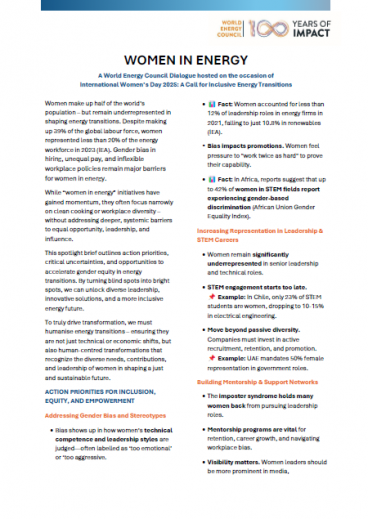World Energy Council’s ‘World Energy Pulse’ Reveals Industry Leaders Expect Crises to Accelerate Pace of Transition
The World Energy Council today released results from its April World Energy Pulse, which polled nearly 700 leaders from across the global energy community. The World Energy Pulse is the first global survey of energy leaders’ attitudes and trends since the outbreak of conflict in Ukraine. The World Energy Pulse shows that attitudes towards energy security, energy affordability and sustainability, the core dimensions that define the World Energy Trilemma, have dramatically shifted since the start of the year and that tensions between them are growing.
As the energy sector continues to manage aftershocks from the impacts of climate change, COVID-19 and the conflict in Ukraine, the World Energy Pulse revealed nearly half of respondents expect the convergence of these crises to accelerate the pace of the transition. The survey marks the first quantitative assessment of the conflict’s impact on the global energy transition.
While investment in diversification of the energy mix is seen as a leading measure to address security and affordability concerns globally, industry leaders said they expect greater investment focused on onshore and offshore renewables in response to the crises. However, amidst a background of increasing energy security concerns, respondents underscored continued importance of investment in hydrocarbons – marking a notable shift away from previous divestment trends.
Dr Angela Wilkinson, Secretary General and CEO at the World Energy Council said:
“The world is reeling from multiple shocks – Covid, climate change/extreme weather, conflict and now cost-of-living. Global energy transition is imperative and was never going to be quick, cheap or easy. It is a complex process that can only succeed if more people collaborate and manage the tensions between energy security, energy affordability and equity, and environmental sustainability – what we call the World Energy Trilemma. Customers are experiencing the pain of higher energy bills and governments must intervene in new ways to connect and synchronise policies on prices, costs, and affordability.
Energy is the lifeblood of modern societies and the pain of failure to better manage global energy developments for people, planet and prosperity is being felt in all regions and by all levels of society. This World Energy Pulse provides a basis to refresh the common interests and differentiated approaches to progressing multiple energy transitions in all world regions and ensure future generations do not pay the price of failing to learn with the increasing diversity in energy.”
Other survey highlights include:
- 86% of global respondents indicated near-universal agreement that governments must intervene to address price shocks and affordability impacts on energy users, despite most respondents indicating very limited government action has been taken to address energy security and affordability to date.
- Over 80% of global respondents signalled direct and/or indirect impacts from the European energy security crisis on their countries’ energy supply chains. The same share of respondents expect disruption to affect energy markets in the long term or permanently, with 25% showing no confidence of a return to pre-crises conditions.
- Most respondents expect countries to seek energy security and resilience through regional or national action – marking a sharp shift away from previous globalization trends.
- Respondents from Africa identified energy affordability and equity as the highest individual short-term concern. Unsurprisingly European respondents identified energy security as its top concern.
The survey findings were based on responses from nearly 700 respondents from around 90 countries across the public and private sector in power and utilities; renewables, nuclear, hydrogen; engineering; oil and gas; and energy efficiency; among others. Additional World Energy Pulses will be conducted over coming months.
For media inquiries, please contact the Council’s media relations team at FTI Consulting: worldenergycouncil@fticonsulting.com or +44 (0)7929847395






_-80_result_688_387_s_c1_c_c.jpg)

